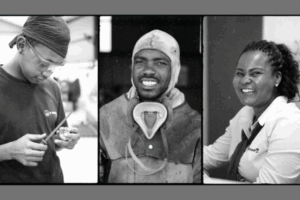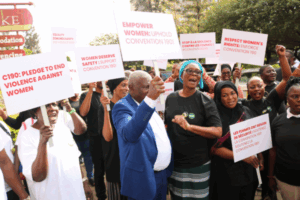ILO Convention 190 emphasizes the significance of collective bargaining in preventing and addressing violence and harassment at work, especially for marginalized workers.
LGBTQ+ individuals face high rates of unemployment, poverty, prejudice, and discrimination, which increase their risk of harm, especially during economic crises. The issue of safety in the world of work is important to LGBTQ+ workers and job seekers.
Trade unions have a mandate to protect and advance equality for LGBTQ+ workers. To do this effectively, unions must be inclusive and address intersecting forms of discrimination, such as being black, a woman, and a lesbian. This means considering the needs of all members in collective bargaining and organising, and enforcing legal rights and international conventions like ILO Convention 190 (C190).
Who is covered by C190
C190 protects workers and other persons in the world of work, including employees as defined by national laws and practice, and persons working irrespective of their contractual status, persons in training, including interns and apprentices, workers whose employment has been terminated, volunteers, job seekers and job applicants, and individuals excercising authority, duties or responsibilities of an employer.
What constitutes violence and harassment in the world of work?
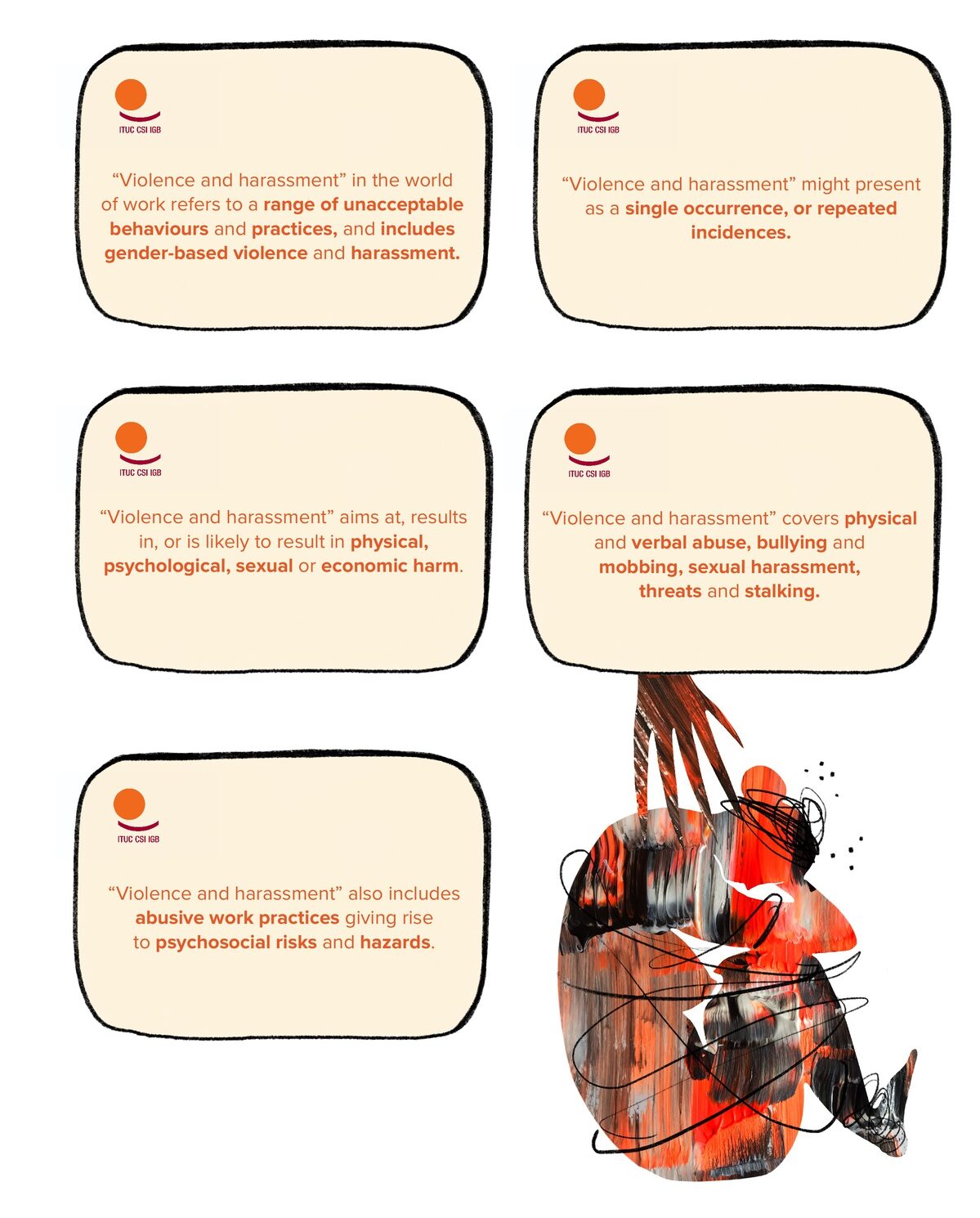
Creating safe spaces for trade union and community dialogues
LGBTQ+ workers and job seekers experienced increased harassment and violence during the Covid-19 pandemic. The impact of Covid-19 varied across sectors, with massive job losses and the erosion of workers’ rights and benefits, particularly in the hospitality, care work, and informal trading sectors. While we lack specific statistics on the number of LGBTQ+ individuals employed in these sectors, anecdotal evidence suggests they are disproportionately represented in the precarious jobs that were hardest hit. During negotiations, LGBTQ+ workers’ rights were at risk of being overlooked, as unions faced immense pressure to defend broader gains won over the years.
The Labour Research Service envisions an inclusive world of work. We connect union and community activists, workers, and young LGBTQ+ job seekers to discuss the role of C190 in ensuring a safe and secure workplace.
World of work:
Describes any process linked to bringing people together in relation to work – from the process of looking for work to the process of having your employment terminated.
ILO Convention 190 Tweet
Challenges for LGBTIQ+ youth entering the workforce
Family breakdown, rejection, and lack of support at home significantly affect the self-esteem and mental health of LGBTQ+ youth. These challenges, compounded by discrimination, bullying, and violence in schools and communities, create barriers for young LGBTQ+ individuals entering the workforce.
LRS Dialogue for youth and activists: A safe space for storytelling and learning
Letsema (our collective impact initiative for addressing GBV in a community) youth shared their discrimination experiences and expectations of rights and safe workplaces.
Six ideas to end discrimination and violence against LGBTQ+ job seekers and workers:
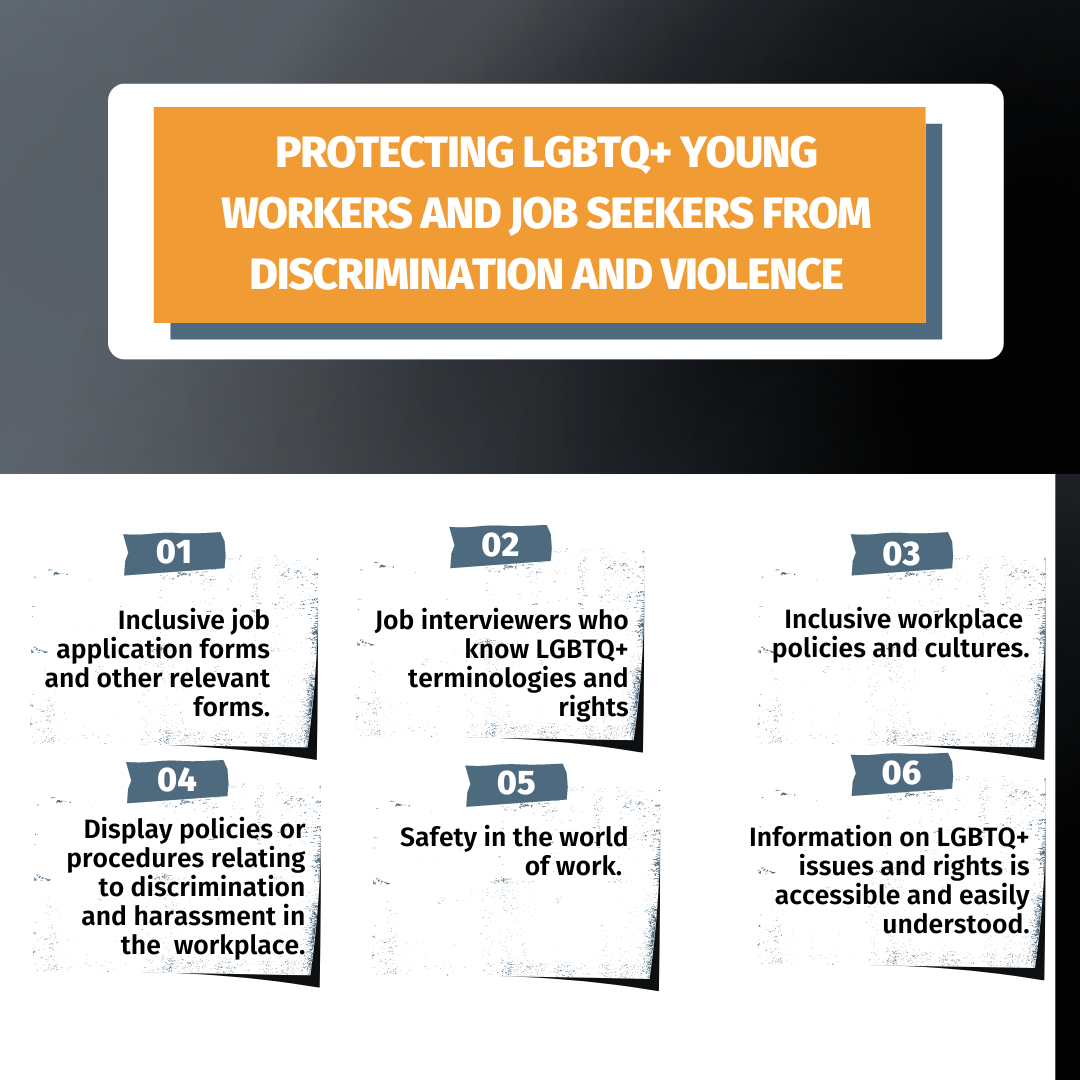
The experiences of LGBTQ+ youth with discrimination
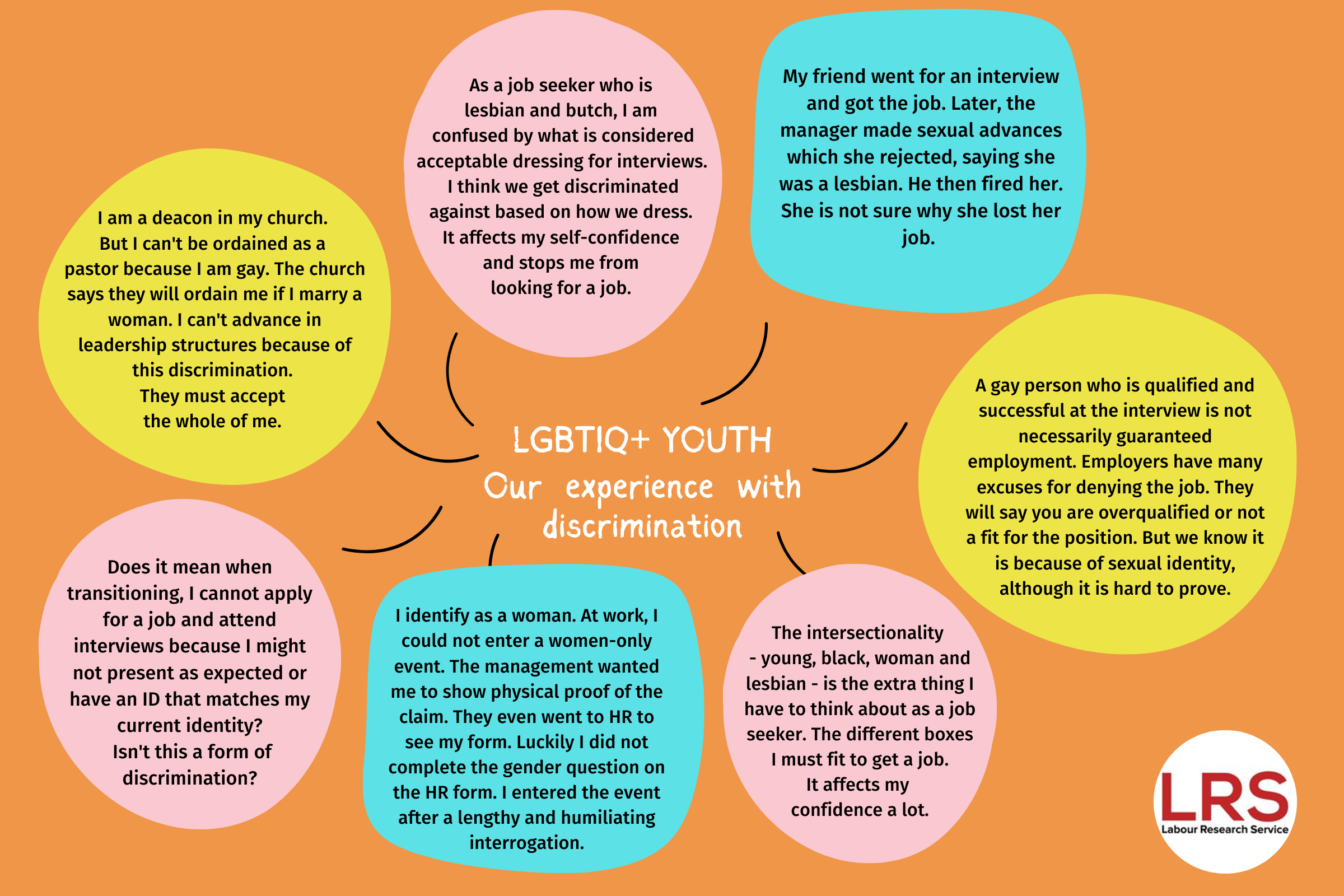
Video: LGBTQ+ young people tell what would make them feel safe in the world of work
LGBTQ+ youth have clear ideas about what would help them feel safe from violence and harassment while searching for employment. The individuals in the video are aged 18-26, with most having completed matric.
Reforming our workers’ organisations
C190 also obligates employers to ensure workplace safety. Unions, as employers, must take measures to prevent violence and harassment within their organizations, aligned with C190 and Recommendation 206. This includes conducting risk assessments, implementing workplace policies, providing training, and raising awareness among staff.
Ending violence and harassment in the world of work requires an "inclusive, integrated and gender-responsive approach, which tackles underlying causes and risk factors, including gender stereotypes, multiple and intersecting forms of discrimination, and unequal gender-based power relations."
C190
FEDUSA’s resolution on Gender Equality has a focus on C190 and reaffirms that:
2) Violence and harassment are incompatible with any notion of decent work. It affects people’s ability to obtain work and stay in work, as well as their physical and mental wellbeing. It affects workplace culture, dignity at work and productivity. It is, therefore, a key issue for trade unions to organise around.
And Resolves:
14) Violence and harassment, in line with C190 and R206, are included in collective bargaining agreements
23) Develops a standalone C190 policy and standards inclusive of penalties for non-compliance.
The federation’s LGBTI rights resolution highlights the importance of recognising the forms of discrimination throughout the employment cycle: Because of their perceived or actual sexual orientation, lesbian, gay, bisexual, transgender, and intersex workers experience discrimination in the labour market throughout the employment cycle. (pg32).
The Congress Resolution on Youth has no specific focus on jobseekers, C190 or LGBTQ+ rights, while the LGBTQ+ resolution has no focus on Youth
Youth Resolution notes and believes:
3) Like elsewhere, young workers in the country face challenges that are unique to them, and therefore it is imperative to establish a youth desk as a sub-structure of the federation to create a platform in which young members can engage in robust debates on critical issues that affect young workers’ lives and social wellbeing
It resolves:
2) FEDUSA and its affiliates should mainstream youth issues into their policies and programmes to create a safe space and opportunities to empower young workers and to give recognition, visibility, and credibility to the youth contributions
Video: Experience of LGBTQ+ workers in the workplace
Tumelo Mokoena (32) works at Transnet and is a member of UNTU and FEDUSA’s Youth Committee. Tumelo speaks about the progressive workplace policies that have helped to bring a positive experience of being an LGBTQ+ worker at the workplace and the union. The story challenges the negative stereotype that unions are not interested in anything beyond increasing the salaries of their members.
Trade union actions for ensuring safe organisations
- Conduct a risk assessment (Article 9 of C190) and identify risks and hazards for violence and harassment, particularly those that “arise from discrimination, abuse of power relations, and gender, cultural and social norms that support violence and harassment” (Para 8c of R206).
- Implement policies on violence and harassment (Article 9a of C190, and Para. 7 of R206).
- Provide information and training on risks and hazards, internal policies, and how to recognise, respond to and advise members about violence and harassment.
- Mainstream gender and C190 provisions into the union bargaining agenda.
- Integrate a gender-responsive approach in all structures, policies, procedures and activities.
- Amend constitutions to have quotas, targets, or parity to improve the representation of women and other vulnerable groups in structures and to ensure that GBVH perspectives stay on the bargaining agenda.
- Build the capacity of women to guarantee full participation.
A trade union looking inward
The South African Commercial, Catering and Allied Workers Union (SACCAWU) has integrated GBVH in the training and education programmes of the union. SACCAWU also has women’s committees that address gender-based violence through awareness campaigns and information materials for workers.
Read: Sanna Patricia (49) worked for over two decades at Edcon. Her story illustrates the importance of family support and acceptance and bringing your whole self to the workplace.
Finding a support system at work: My experience as a lesbian worker in the retail sector
Highlights of C190 and the Code of good practice on the prevention and elimination of harassment in the world of work
ILO Convention 190
- It is the first time that the right to a world of work free from violence and harassment has been recognised in an international treaty.
- It clearly shows that violence and harassment are not part of the job.
- It provides the first internationally agreed, single definition of violence and harassment, which sets the base for trade unions to fight against violence and harassment.
- It provides a clear, inclusive, and integrated framework to promote action to achieve change.
- It covers the world of work, not just the workplace.
- It acknowledges the changing nature of the world of work, and so should stand the test of time.
- It recognises the negative role played by unequal power relations between men and women, as well as other social norms that support violence and harassment, and encourages everyone to take a gender-responsive approach.
- It recognises that domestic violence is an issue in the world of work and that measures can be taken at work to mitigate its impact.
Code of good practice on the prevention and elimination of harassment in the world of work
- The Employment Equity Act is one of the Acts that are relevant to the implementation of South Africa’s obligations to C190. The Code forms part of the Employment Equity Act.
- The Code identifies harassment as including physical abuse, psychological abuse, emotional abuse and sexual abuse.
- The Code identifies all forms of harassment against women, men and LGBTQIA+ and vulnerable persons as an abuse of power.
- The Code identifies the steps employers must take to eliminate harassment including developing and implementing policies, procedures and practices that will lead to the creation of workplaces free of harassment.
How employers can create diverse and inclusive workplaces that are free from violence and harassment
- Adopt a harassment policy that takes cognisance of and is guided by the Code.
- Develop clear procedures to deal with harassment including an obligation to investigate any report of an alleged incident of harassment.
- Ensure that confidentiality is kept in all cases.
- Grant additional sick leave for trauma counselling if the worker’s sick leave has been exhausted.
- Conduct education on sexual harassment and other forms of harassment
REFERENCES
- Mini guide to ILO C190 and 206
- C190 Train the Trainers Toolkit (Facilitator guide)
- Code of good practice on the prevention and elimination of harassment in the world of work
- FEDUSA resolutions | 2021
- LRS webinar assets and facilitator’s designs
RELATED ARTICLES:
Implementing C190: Lessons from South Africa on ending violence in the world of work
Working against discrimination and homophobia in the workplace
Coming out at work: A practical guide for LGBT workers
This work is made possible through the support of The Other Foundation and the International Federation of Workers’ Education Associations.







